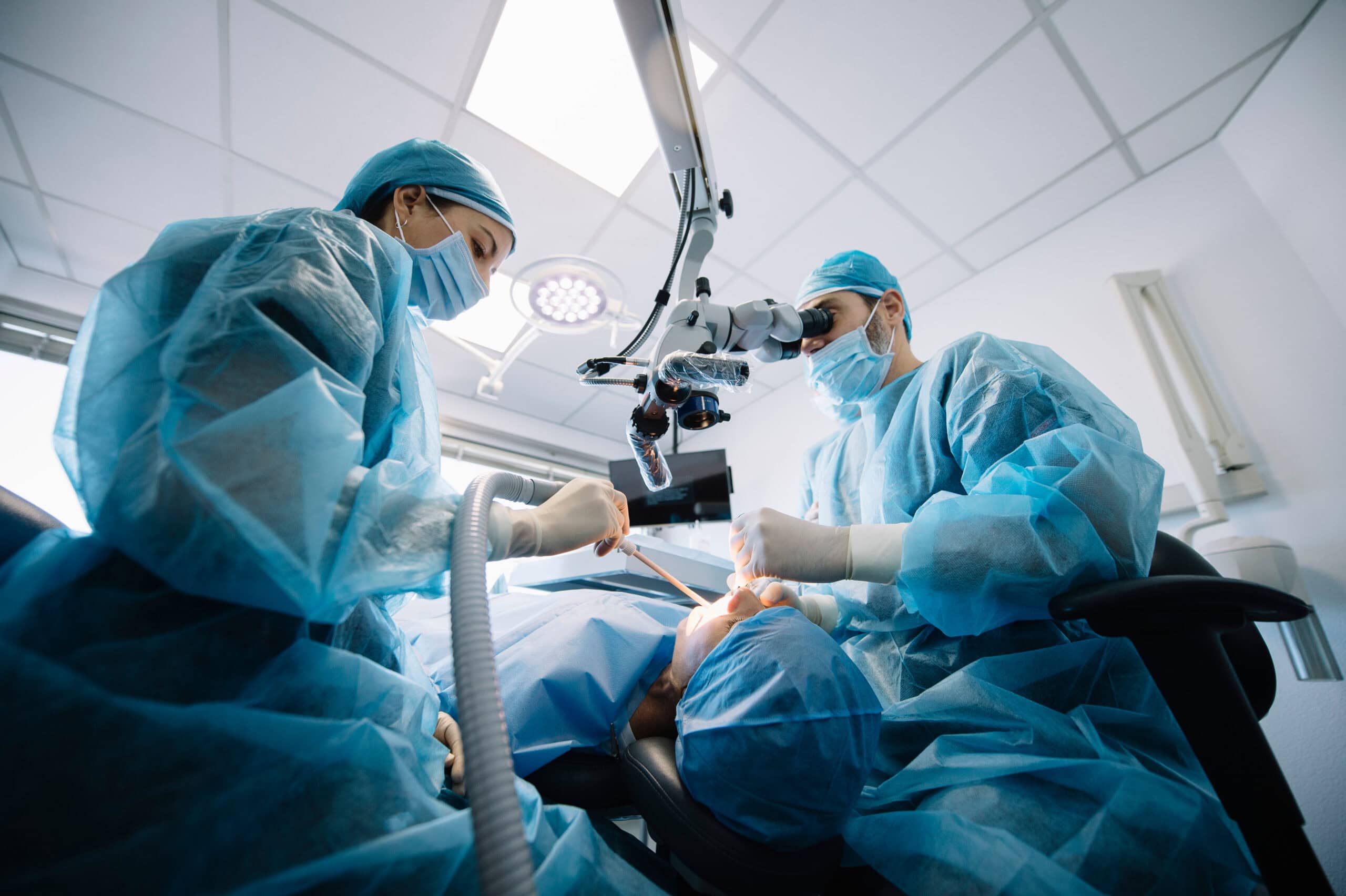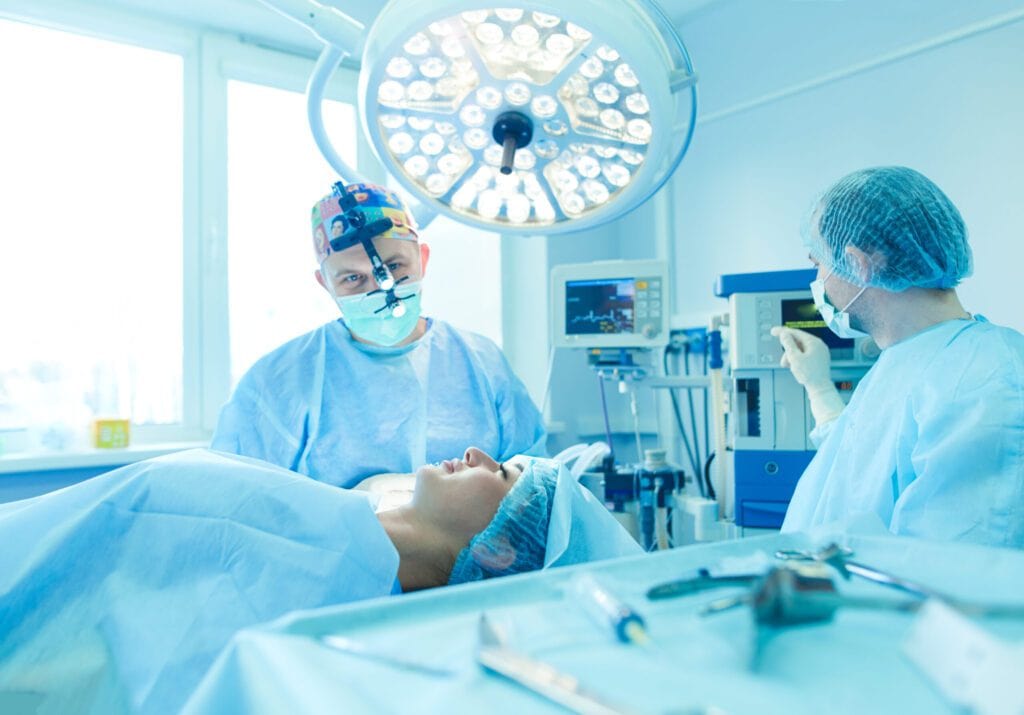General Anaesthesia
- Home
- General Anaesthesia

General Anaesthesia
General Anaesthesia for Dental Procedures
General anaesthesia is a state of controlled unconsciousness where medications are used to send the patient to sleep. It is utilised in various medical fields, including in Perth dentist practices, to provide pain relief and amnesia for procedures that might otherwise be uncomfortable or distressing.
In dentistry, general anaesthesia is used to facilitate dental treatment by rendering the patient unconscious, allowing the dentist to perform complex or lengthy dental treatment without causing the patient any discomfort or distress. Using a general anaesthetic helps ensure that the patient doesn't remember the procedure afterwards, which can be particularly beneficial for patients with dental phobia or anxiety.
General anaesthetics may be used for any type of dental procedure where it is deemed necessary, such as wisdom tooth extractions, placement of dental implants, or oral surgeries that are extensive or complex. It can also be employed in cases where the patient has high anxiety, uncooperative behaviour, or certain medical conditions.
One of the main effects of a general anaesthetic is the control it provides over the patient’s body functions. It allows the medical team to control aspects such as blood pressure during the dental procedure, providing a safe and controlled environment for both the patient and the dentist.
The Benefits of General Anaesthesia for Dental Treatment
General anaesthesia in dentistry offers numerous benefits, primarily by enabling a comfortable and anxiety-free environment for patients undergoing dental treatment. It is an essential tool for managing pain, fear, and discomfort, making it possible for many patients to receive the dental care they need.
Alleviating Dental Anxiety
Dental anxiety is a common issue affecting a significant number of individuals. It can range from mild uneasiness to severe phobia, causing some patients to avoid dental care altogether. This avoidance can lead to worsening oral health over time. For anxious patients, using a general anaesthetic can alleviate these fears and allow them to receive the necessary dental treatment without undue distress.
Supporting Patients with Special Needs
Patients with special needs often face additional challenges during dental procedures. These can include difficulties cooperating with the treatment, sensory issues, or other medical conditions complicating dental care. In these cases, general anaesthesia can prove beneficial, helping to provide a safe and comfortable environment for their dental treatment needs.
Facilitating A Lengthy Dental Procedure
Certain procedures, especially complex surgical procedures, can be lengthy and demanding for patients. Under normal circumstances, it may be uncomfortable or distressing for patients to stay open-mouthed for extended periods or feel pain. However, with the use of general anaesthetics, dental surgery can be performed more comfortably and efficiently, ensuring that patients do not feel any pain or discomfort during the procedure. This can be particularly beneficial for adult patients who need extensive dental work or those with serious medical problems or conditions involving increased risk or sensitivity to pain.
Potential Risks and Complications of General Anaesthetics
While general anaesthetics offer numerous benefits, they also have potential risks and complications. Understanding these risks is crucial to make informed decisions about dental care.
Patients with pre-existing medical conditions, such as high blood pressure, heart disease, or obesity, may have a higher risk of complications. However, the risk is also influenced by the complexity of the dental procedure, the patient’s age, and overall health.
Common side effects of general anaesthesia include a sore throat or dry mouth after the procedure due to the breathing tube used during anaesthesia. Some patients may also feel sleepy or disoriented for a few hours following the procedure, and nausea or vomiting can occur.
More severe complications, though rare, can include an allergic reaction to the anaesthetic, a heart attack during or after the procedure, or a stroke. It’s important to note that these serious complications are extremely rare, especially in dental treatment, and every effort is made to minimise these risks during surgery.
Risks are managed by thoroughly assessing each patient’s health status prior to the procedure. This includes a detailed medical history, physical examination, and sometimes additional testing. The anaesthesia is administered and monitored by a trained professional.
While there are potential risks associated with using a general anaesthetic, it is generally considered safe when administered by trained professionals in a controlled environment, with the benefits often outweighing the risks for many patients. It’s crucial that patients discuss these risks and their concerns with their healthcare provider to make the best decision for their individual situation.

Preparing for a Dental Procedure with General Anaesthesia
When preparing for a dental procedure that involves a general anaesthetic, there are several steps patients can take to ensure the process goes smoothly. An important part of this process is informed consent.
Before the procedure, a preoperative assessment will be conducted to evaluate the patient’s general health. This involves reviewing the patient’s medical history and any current medications. It’s crucial to provide all relevant medical information, including allergies or previous reactions to anaesthesia.
It is generally recommended to stop smoking at least a few weeks before surgery, as smoking can increase the risk of complications during and after the procedure.
Patients are usually instructed not to eat or drink anything for at least six hours prior to the procedure. This is because the reflexes that normally keep food and drink from entering the lungs are inhibited under anaesthesia.
Patients should also arrange for a companion to accompany them to the hospital or dental clinic, as they cannot drive or use public transportation after receiving general anaesthesia. The companion should be prepared to drive the patient home and ideally stay with them for 24 hours following the procedure.
It’s important to bring any relevant documents or items to the hospital, such as a list of current medications, personal identification, and health insurance details.
Informed consent is an essential aspect of this preparation. This means understanding the procedure, its risks and benefits, and the reason for the guidelines. Patients should discuss any concerns or questions they have about the procedure or the anaesthesia with their healthcare provider before the day of the procedure. This can help to alleviate any anxiety and ensure the patient is fully prepared for what to expect.
What to Expect During Dental Treatment with General Anaesthesia?
When undergoing dental treatment with a general anaesthetic, knowing what to expect is important. Here is a step-by-step guide on what happens during the procedure:
Arrival at the Hospital/Clinic: Upon arrival at the hospital or dental clinic, the patient will be checked in and prepared for the procedure. This often involves changing into a hospital gown and removing any jewellery or dentures.
Preoperative Assessment: The anaesthesiologist will review the patient’s medical history, discuss the anaesthesia plan, and answer any remaining questions.
Starting the Anaesthesia: An intravenous line (IV) is typically inserted into a vein in the patient’s hand or arm. This IV line allows for the administration of the general anaesthetic and other necessary medications.
Induction of Anaesthesia: The general anaesthetic is administered through the IV line, leading the patient into a sleep-like state where they will not feel any pain or discomfort. Sometimes a muscle relaxant is also given to prevent any movement during the procedure.
Monitoring Vital Signs: Throughout the procedure, the anaesthesiologist continually monitors the patient’s heart rate, blood pressure, breathing, and oxygen level. The aim is to maintain these within safe and normal ranges.
Dental Procedure: Once the person is under the effects of the general anaesthetic, the dentist or oral surgeon will perform the planned dental procedure or surgery.
Emergence from Anaesthesia: After the dental procedure is completed, the effects of the anaesthesia are reversed. The patient will gradually wake up from the sleep-like state, though they might feel groggy or disoriented initially.
Postoperative Care: The patient will be moved to a recovery room where their vital signs continue to be monitored as the anaesthetic wears off. They will be discharged once the medical team is confident that the patient is stable.
Undergoing dental treatment with general anaesthesia is a well-monitored and carefully controlled process. The dental team, including the dentist and anaesthesiologist, works together to ensure the patient’s safety and comfort at all stages of the procedure.
What to Expect After Dental Treatment with General Anaesthesia?
After undergoing dental treatment with a general anaesthetic, patients will be moved to a recovery room, where they will be closely monitored until they slowly wake up from the effects of the anaesthetic. This process can take anywhere from a few minutes to a couple of hours, depending on the individual and the specific surgery they’ve had.
Once awake, patients may feel groggy, disoriented, or sleepy. These feelings should gradually fade, but it’s essential for the patient to have someone to drive them home and stay with them for the first 24 hours.
There are several common side effects that patients might experience after receiving general anaesthetics. These can include nausea or vomiting, dizziness, headache, and a sore throat or dry mouth due to the breathing tube used during the procedure. These side effects are usually temporary and should improve within a few hours or days.
The dentist or oral surgeon may prescribe pain medication or recommend over-the-counter pain relievers for pain management. Following the healthcare provider’s instructions for managing pain after the procedure is important.
Hydration and rest are crucial during recovery. Patients should drink plenty of water and avoid strenuous activity for a few days. They should also follow any specific post-operative care instructions provided by their dentist or oral surgeon, such as diet recommendations or oral hygiene instructions.
If patients experience pain, excessive bleeding, or any other symptoms that concern them, they should contact their healthcare provider immediately.

Frequently Asked Questions
Are you fully asleep with general anaesthesia?
Yes, general anaesthesia puts you in a deep sleep-like state. It’s not like regular sleep, but you won’t be aware of what’s happening throughout the procedure.
How long does it take to recover from general anaesthetic?
Recovery times can vary depending on the individual and the specific treatment received. General anaesthesia’s effects commonly wear off within a few hours of the surgery, but some people might feel groggy for up to 24 hours. Discussing your recovery timeline with your healthcare provider is always important.
Is general anaesthesia safe?
Yes, general anaesthesia is generally safe for most patients. Your healthcare team will closely monitor your oxygen levels, blood pressure, and other vital signs during the procedure. However, like any medical procedure, there can be side effects and risks, which you should discuss with your healthcare provider.
Who is a good candidate for general anaesthesia in dentistry?
General anaesthesia in dentistry is particularly beneficial for anxious patients, those undergoing extensive surgery, or those who have difficulty staying still. Your suitability for general anaesthesia will be assessed by a medical doctor before the procedure.
Can I eat or drink before a dental procedure with general anaesthesia?
You should not eat or drink anything six hours prior to the procedure. This helps to prevent complications during the surgery.
How long will it take to recover from general anaesthesia?
Most people begin to recover from the effects of general anaesthesia within a few hours of surgery. However, full recovery can take up to 24 hours, depending on the specific treatment and individual factors.
What are the side effects of general anaesthesia?
Some common side effects of general anaesthesia can include nausea, dizziness, and confusion after waking up. It’s also worth noting that individuals who consume heavy alcohol may experience more pronounced side effects.
Will I feel any pain during the dental procedure with general anaesthesia?
No, you should not feel any pain during the procedure. General anaesthesia induces a deep sleep-like state where you will not be aware of the procedure.
Can I drive home after receiving general anaesthesia for a dental procedure?
No, you should arrange for someone else to drive you home after the procedure. The effects of the anaesthesia, such as drowsiness and slowed reaction times, can make driving unsafe.
How long before the procedure do I need to stop eating and drinking?
You should stop eating and drinking at least six hours prior to the treatment.
Can children have general anaesthetics for dental procedures?
Yes, children can have general anaesthetics for a dental procedure, but it’s important to discuss this with your child’s dentist or an anaesthesiologist to understand the risks and benefits.
Who will administer general anaesthesia?
A general anaesthetic is typically administered by a medical doctor known as an anaesthesiologist, who will monitor your vital signs throughout the procedure.
Welcome to Acts Dental: Your Pathway to Exceptional Dental Health
Ready to transform your dental experience? In our Dental clinic in South Perth, we’re dedicated to delivering top-tier dental care with a personal touch. Our highly skilled dentists are ready to guide you on your journey to outstanding oral health.
We offer a wide array of services, making sure to provide the most comfortable and effective treatment options for our patients. Whether you need a routine cleaning or more complex treatments, we’ve got you covered. Our clinic is equipped to provide both local anaesthesia and conscious sedation, ensuring your comfort throughout your visit.
Here at Acts Dental, we believe that quality dental care should be accessible and affordable. We are Medibank preferred provider,Bupa preferred provider, HBF preferred provider, HCF preferred provider, and Nib preferred provider dentist in Perth. As a preferred provider, you not only benefit from our high-quality dental insurance options to help make your dental care journey as smooth and stress-free as possible.
Take the first step towards a healthier smile and a more comfortable dental experience by calling (08) 9474 5083.

